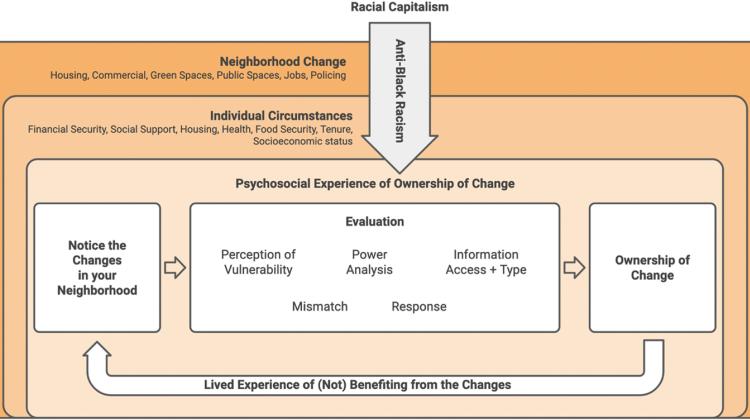Community Ownership for Greater Physical and Mental Health

Model of the psychosocial process of ownership of change
How do changes in the structure of a neighborhood impact the health of residents of that neighborhood? Could new models for increasing resident power over processes of change and development in communities enhance health outcomes for all residents?
A new paper from a collaboration between researchers from DUSP’s Healthy Neighborhoods Study (HNS) and the Conservation Law Foundation (CLF) demonstrates how experiencing a greater sense of ownership over the changes happening in one’s neighborhood is linked with better physical and mental health and happiness.
“Decades of redlining and racism have affected communities of color, and now gentrifying development is threatening these neighborhoods all over again,” said Reann Gibson, a Research Scientist at CLF. “The study’s findings are yet one more reason why people must have power over the changes that could profoundly alter their communities.”
The HNS is a partnership of planners, advocates, academic researchers, community-based organization leaders, and fifty resident researchers in nine Greater Boston-area communities convened by CLF and the Massachusetts Institute of Technology. It is the largest and longest running participatory action research study of its kind.
“Community health depends on redistributing power over neighborhood change,” said DUSP alum and one of the study’s authors, Andrew Binet (MCP ‘15, PhD ‘21). “These findings should encourage urban planners and policymakers to stretch past conventional approaches to participation or engagement and seek to foster ownership over neighborhood changes. I mean ownership both in terms of political and economic power. This will involve building democratic mechanisms for community members to determine the vision and set the agenda for development in their neighborhood and to reap the benefits of the changes that happen to their neighborhoods. There is no cookie-cutter way to do this, but there are many strategies we can experiment with: it behooves us to figure it out.”
Authors of the paper include: Binet, Yael Nidam (MCP ‘19), Rebecca Houston-Read (MCP candidate), César Garcia Lopez (MCP ‘22), Gabriela Zayas del Rio (MCP ‘21), Dina Abreua, Carl Baty, Arnetta Baty, Josee Genty, Goldean Graham, Jeff Joseph, Will Justice, Gail Roderigues, David Underhill, Vedette R. Gavin, and Mariana C.Arcaya (MCP ‘08).


